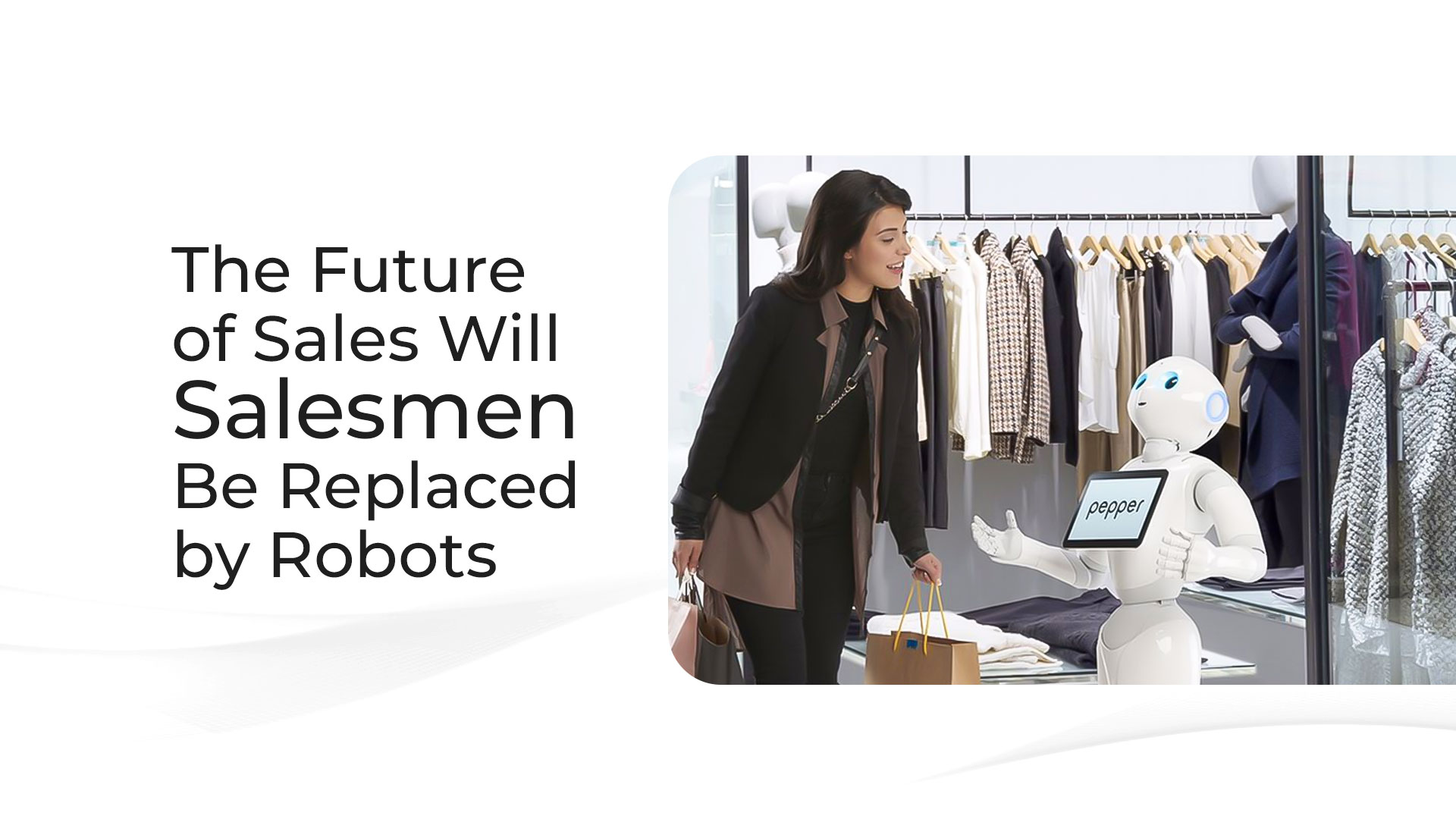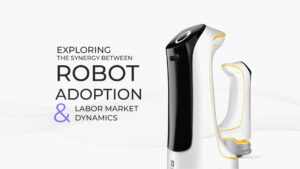In the dynamic intersection of commerce and technology, the future of sales stands at the cusp of a transformative revolution, propelled by the pervasive rise of automation and the integration of robots into traditional sales methodologies. As we embark on this exploration, the question echoing through boardrooms and industry conversations is unmistakable: “Will salesmen be replaced by robots?” Unveiling the evolution of technology within sales processes, we navigate a multifaceted narrative that transcends speculation, offering insights into the collaborative landscape where human ingenuity and AI power unite to redefine the very essence of sales.
Table of Contents
The Rise of Automation in Sales
In the dynamic realm of sales, the seismic shift towards automation is reshaping traditional methodologies and fueling conversations about the role of robots in this ever-evolving landscape. As we navigate the contours of this transformative journey, we explore key facets that underscore the profound impact of automation on sales processes.
A. Unveiling the Evolution of Technology in Sales Processes
Will salesmen be replaced by robots? To answer this question, we must first unravel the intricate evolution of technology within sales processes. Over the years, sales methodologies have transcended manual, labor-intensive practices to embrace cutting-edge technologies. From the advent of customer relationship management (CRM) systems to the integration of artificial intelligence, the metamorphosis has been relentless. These technological leaps have enhanced efficiency and have paved the way for the seamless integration of automated processes into the intricate tapestry of sales.
B. Navigating the Impact of Automation on Sales Tasks
Intrinsically linked to the evolution of technology is the palpable impact that automation has exerted on the very tasks that define sales endeavors. The embrace of automated tools and platforms has ushered in an era of unparalleled efficiency, freeing sales professionals from mundane, repetitive tasks. thereby empowering to focus on what truly matters – meaningful interactions and strategic decision-making.
C. Pioneering the Concept of Using Robots as Salesmen
Amidst the reverberations of automation, the concept of utilizing robots as salesmen emerges as a groundbreaking frontier. As we contemplate the future, the question looms large: Will salesmen be replaced by robots? The integration of robots into sales roles signifies a paradigm shift, where artificial intelligence transcends its supportive role and assumes a more assertive stance in customer interactions. This concept goes beyond mere automation, envisioning a future where robots seamlessly engage with clients, harnessing advanced algorithms to analyze data and tailor personalized experiences.
Current Landscape of Using Robots as Salesmen: From Chatbots to Showrooms
The use of robots in sales is no longer the stuff of futuristic movies. Companies are actively experimenting with a range of robotic solutions, as next:
Chatbots: These AI-powered virtual assistants are taking over customer service and lead generation, Companies like Sephora and Domino’s Pizza are using chatbots to answer product questions, recommend items, and even take orders.
Robotic Kiosks: These interactive kiosks are popping up in retail stores, airports, and even hospitals. They can provide product information, answer questions, and even process payments, reducing wait times and improving customer experience.
Humanoid Robots: While still in their early stages, humanoid robots are being tested in some high-end retail stores and showrooms. These robots can greet customers, answer questions, and even demonstrate products in a more personalized way.
Industries Embracing Robotic Sales: From Tech to Travel
While the use of robots in sales is still in its infancy, some industries are leading the charge like :-
Travel:
Airlines and travel agencies are using chatbots to answer booking questions and suggest personalized travel packages.
Retail:
Amazon Go stores use a combination sensor to track customer purchases and automatically charge their accounts, eliminating the need for cashiers.
Robot Salesmen’s Market Size: A Million-Dollar Handshake with AI?
Will humans soon be shaking hands with robotic colleagues while closing deals? The rise of AI in sales has ignited this very question, and the answer lies within the burgeoning market for robot salesmen. Let’s explore the current footprint and future potential of this game-changing field
A. Sizing Up the Sales Robot Arena:
The global chatbot market size is estimated to be USD 5.86 billion in 2023, and is expected to reach USD 21.08 billion by 2028, growing at a CAGR of 29.18% during the forecast period according to a recent [Mordor intelligence]. Chatbots alone, the digital foot soldiers of AI sales, are a multi-billion-dollar industry, and their ranks are swelling.
B. The Boom of Robotic Sales:
Beyond basic interactions, AI is flexing its muscles in areas like product recommendations, lead generation, and even closing deals. Predictive analytics tools powered by AI can identify and target potential customers with laser precision, while automated negotiation platforms can optimize pricing and terms, all without the need for human intervention.
– However, the question remains: will robots replace human salespeople altogether? The answer, like a good sales pitch, isn’t a simple yes or no. While AI excels at data-driven tasks and tireless execution, it lacks the human touch: the art of building rapport, navigating emotional nuances, and forging long-term relationships, the future of sales is likely a powerhouse duo of human expertise and AI augmentation.
– So, will robots replace salesmen? Not entirely. Rather, they’ll redefine the landscape, paving the way for a sales revolution where the handshake is a high-five between human ingenuity and AI power.
Ready, Set, Robot: Successful Implementations of AI Salespeople
While the question of “will salesmen be replaced by robots” continues to spark debate, several companies are already proving the viability of AI-powered sales tools. These real-world examples showcase how robots are not here to steal jobs, but to revolutionize the sales landscape alongside their human counterparts.
Chatbots Crack the Code to Customer Connection
Meet Mitsuku, the Sales Champ: Remember chatbots with robotic, canned responses? Meet Mitsuku, a human-like AI that learns and adapts to customer queries in real-time. Used by companies like Unilever, Mitsuku delivers personalized product recommendations and even engages in witty banter, building positive rapport and closing deals without a human salesperson in sight.
Bots Boost the Bottom Line
Beyond Basic Banter: AI sales tools go beyond simple conversation. Companies like Sephora deploy virtual assistants that analyze customer purchase history and recommend complementary products, boosting average order value without the need for human intervention.
From Brick-and-Mortar to Mobile
The Rise of Retail Robots: Imagine a robot salesperson greeting you in a store, answering your questions, and even demonstrating products. Companies like Proven Robotics are making this a reality with Pepper, a humanoid robot that enhances the in-store customer experience and gathers valuable data on shopper preferences.
The Human Touch Remains King (for Now)
Remember, the story of “will salesmen be replaced by robots” is still being written. While AI’s role in sales will undoubtedly grow, the human touch will remain irreplaceable. As we embrace this technological evolution, the focus should be on creating a collaborative sales environment where humans and robots work together to deliver exceptional customer experiences and drive business success.
Future Implications and Trends
In this visionary exploration of the future of sales, we cast our gaze toward the horizon of possibilities, where the interplay of innovation and automation charts a course for unprecedented transformations. The question that lingers in the air, will salesmen be replaced by robots?, finds resonance in the potential developments and emerging technologies poised to shape the future of sales.
A. Predicting Potential Developments in the Use of Robots in Sales
As the integration of robots into sales gains momentum, the future promises a myriad of developments that extend beyond the current landscape. Predicting the trajectory of this evolution involves envisioning advanced robotic capabilities. Autonomous robotic agents may become more adept at navigating complex sales scenarios, offering real-time insights and recommendations. These potential advancements herald a future where the collaboration between humans and robots in sales becomes increasingly seamless and effective.
B. Emerging Technologies that Could Shape the Future of Sales
The future of sales is intimately tied to the relentless march of emerging technologies, each holding the potential to redefine industry landscapes. Artificial Intelligence (AI) and machine learning stand at the forefront, poised to unlock new dimensions in predictive analytics and customer behavior forecasting. Augmented Reality (AR) and Virtual Reality (VR) technologies could revolutionize product demonstrations and customer experiences, providing a novel dimension to the sales journey. Blockchain technology may bring unprecedented transparency to transactions, fostering trust in customer interactions..
As we peer into the future implications and trends, the prospect of robots in sales transcends the mere replacement of salesmen. Instead, it paints a portrait of a dynamic and tech-infused sales landscape where humans and robots collaborate to deliver unparalleled value, ushering in an era where the question of will salesmen be replaced by robots becomes an exploration of the limitless possibilities awaiting us.
Final Words
The question of whether salesmen will be replaced by robots leads to a nuanced conclusion: the collaborative landscape of the future, where the synergy between human expertise and AI augmentation redefines the sales experience, ensuring a handshake remains a high-five between human ingenuity and AI power.




